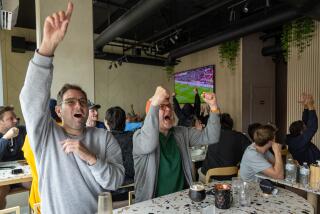They don’t walk alone to Athens
- Share via
ATHENS — It’s humongous and floating into town Wednesday night, but exactly what is it?
It’s the European Champions League soccer final, it’s just about as eyeballed as the Super Bowl, and it’s so big it induces some people to drive here from Liverpool, England, across England, under the English Channel, across exactly 10 countries and roughly 2,000 miles with, of course, that logical stopover in Belgrade.
Side note: These people have no tickets.
It’s also a 52-year-old annual soccer tournament that began last July with qualifying, peeling top teams from the previous season from 52 countries in July, with 32 qualifying by September, then 16 breaking clear for the knockout round by February.
The two finalists -- England’s Liverpool and Italy’s AC Milan -- breathed to scrap for an overgrown cup here, and the number of TV viewers figures to hover somewhere near the estimated 86 million who watched Barcelona versus Arsenal in Paris in 2006, which would be 7 million shy of the number watching Indianapolis versus Chicago in Miami in the 2007 Super Bowl.
Then, after all of that, the soccer champion of Europe will be a team sitting third in England, 21 points behind the leader, or a team sitting fourth in Italy, 33 points behind the leader.
If that’s confusing, the confusion itself reinforces another part of the Champions League, its annual proof of a maxim: Europeans possess highly evolved sports brains.
Hailing from old, even ancient cultures, they’re very gifted at compartmentalizing, able to track a favorite club through not only one title chase a season, but chases, plural. They follow their clubs in the league standings in their own nations, sure, but also, if good enough, in the concurrent Champions League, and maybe in still more.
In England, that number of soccer titles can be four or even five, or enough to blow gaskets in a U.S. brain reared on one team, one dream. This year Chelsea (London) won the Carling Cup tournament (featuring 72 English clubs), and Chelsea won the FA Cup tournament (featuring 687 English clubs), but Manchester United won the Premier League title (38-game season), and Liverpool might win the European title.
That’s an awful lot of happiness, but everyone prioritizes. Apparently all 50 million English citizens agree that in the soccer pecking order the Carling Cup ranks a distant fourth, and apparently roughly 49 million agree the FA Cup ranks a healthy third, even though it’s remarkably old, having begun in 1871.
That leaves the other two for quandary felt throughout Europe: Would you rather win the Premiership or the Champions League?
Ask fans, and they’ll prize the one they haven’t won or haven’t won lately. Ask coaches, who do have contracts to renew, and they’ll opt shockingly for the one they’ve won over the one they haven’t, after they’ve battled the puzzle of gauging player lung endurance trying to win both.
Liverpool fans, with five European titles, including 2005 but no English Premier League titles since 1990-91, choose winning the English league at this point, and fans of the London clubs Chelsea and Arsenal opt for the Champions League, because neither has won that but both have won the English league during the last four years.
Alex Ferguson, the Manchester United coach, goes for the English league because he says it’s harder, even though he has won nine of those (including this year) to one in Europe (a semifinal ouster this year in Milan shocking for its 3-0 thoroughness). AC Milan Coach Carlo Ancelotti tilts toward Europe, which AC Milan has won six times, second all time behind Spain’s Real Madrid (nine).
Rich in contrasts and quibbles, the European competition starts by ranking the entire European leagues themselves. The top three soccer nations -- generally Italy, Spain and England -- get in their top four teams (and often energizing the race for No. 4), with the next three nations getting three spots and the next nine getting two.
As the whole machine reaches Athens, the city prepares for its biggest moment since the 2004 Olympics closing ceremonies.
It could qualify for that with Liverpool alone. The BBC reported that Liverpool’s John Lennon Airport had tacked on 57 charter flights for the migration, and of the 50,000 inbound fans, the greater portion figures to come wearing red and singing “You’ll Never Walk Alone,” the 1945 Rodgers and Hammerstein Broadway hit Liverpool fans croon to their players.
They’ll have to make their trademark noise -- new American owner George Gillett calls it “like nothing I’ve ever heard or felt” -- in pockets around the city. Very few will have tickets, with only 17,000 allocated to each club. Nevertheless, they are still coming.
More to Read
Go beyond the scoreboard
Get the latest on L.A.'s teams in the daily Sports Report newsletter.
You may occasionally receive promotional content from the Los Angeles Times.








